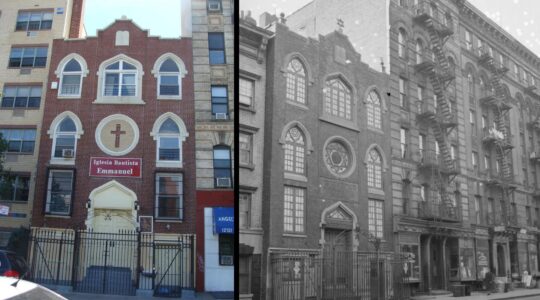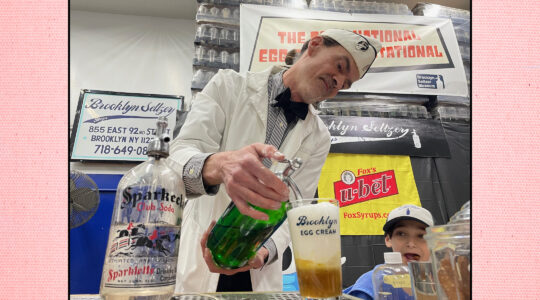It’s easy to be a religious dilettante, harder to take religion seriously, if only because serious religion entails zealotry, a “bad word,” these days. Zealotry need not be evil, however. To be sure, “evil” zealotry feeds on hatred, grows fat on violence, and blights our very right to say that we are human. But “good” zealotry is what sustains our noblest ideals in the face of opposition. It took zealotry, for example, for abolitionists to build the underground railroad; or for righteous gentiles to hide Jews during the Shoah.
We see them both, good and bad, in the two-part story of Pinchas.
In part one, last week, the Israelites “whore” after Midianite women who inveigle them into idolatry. God’s anger explodes. Moses orders mass execution. God adds an accompanying plague, to boot.
As part of this, an Israelite man introduces a Midianite woman to his friends, probably as his wife-to-be. Pinchas, a Kohen, murders them both, thereby expiating the “crime” and ending the plague.
The Torah considers this “good” zealotry, as we see from part two, this week, where God rewards Pinchas with a special covenant and the “everlasting” High Priesthood. The Mishnah concurs by codifying Pinchas’ zealotry as normative: “If a man cohabits with an Aramean woman, zealots may kill him.”
But the Talmud effectively reverses the Mishnah’s ruling by demanding conditions that cannot be met. The woman must be an idolater; the zealot must be acting for God; the couple must be seen engaging in actual intercourse, and there must be at least ten witnesses. Also, any would-be avenger who asks permission is told that Jewish law prohibits it. For the Talmud, Pinchas is a zealot for evil.
These two faces of zealotry are reinforced in a Targum tradition that identifies Pinchas as none other than Elijah, another zealot – sometimes for evil [I Kings 18], where he defeats the prophets of Baal, but then unduly and gratuitously slaughters them, as well. He is also a zealot for good, however: a healer, who resurrects the child of a poor widow [I Kings 17], and it is Elijah who will someday herald the coming of the Messiah.
Medieval tradition conflated Elijah, the herald, with the Messiah whom he heralds. Haggadah imagery, for example, pictures someone with a shofar (Elijah) and/or someone on a white donkey (the Messiah) collecting Jews on Seder eve to bring them to Jerusalem. But sometimes, it is hard to tell one from the other, and sometimes one image stands for both.
The Messiah too, after all, is a zealot, good and bad. The “bad” comes through in traditions that picture the Messiah as a warrior, bringing wanton destruction in his wake. Do we really want a Messiah as God’s avenger, “pouring out wrath on the nations” — men, women and children, presumably — “who do not know You” (from the traditional Passover Haggadah, based on Psalm 79:6)? Sure, these traditions often reflect reactions to our own persecution, but still, do we really believe them? “Men, women and children” after all!
But again, we have the positive side, the Talmudic tradition that even as we await the Messiah’s public appearance, that very same Messiah sits outside the city’s gates bandaging the wounds of lepers.
By its very nature, religion is messianic — insofar as it demands a better time, an end to oppression and pain. By our very nature as serious religionists, we sense the obligation to do whatever we can to be messianic ourselves, lest we accept evil and suffering as simply the way the world is. But which Messiah do we strive to be? The healer or the warrior, the good or the bad?
In terms of Pinchas, the question is what Pinchas we have in mind: the zealot for good (as the Bible has it) or for evil (as the Talmud prefers). I take the Talmud as Judaism’s final word. Jewish law lines up against him.
Healing the world is not inherently harder than conquering it. I choose healing over hurting.
Rabbi Lawrence A. Hoffman, co-founder of Synagogue 3000, and professor of liturgy, worship and ritual at Hebrew Union College-Jewish Institute of Religion, is the author of “My People’s Prayer Book: Traditional Prayers, Modern Commentaries” (Jewish Lights), winner of the National Jewish Book Award.
Candlelighting, Readings:
Shabbat Candles: 8:11 p.m.
Torah: Numbers 25:10-30:1
Haftarah: I Kings 18:46-19:21
Havdalah: 9:12 p.m.
The New York Jewish Week brings you the stories behind the headlines, keeping you connected to Jewish life in New York. Help sustain the reporting you trust by donating today.




